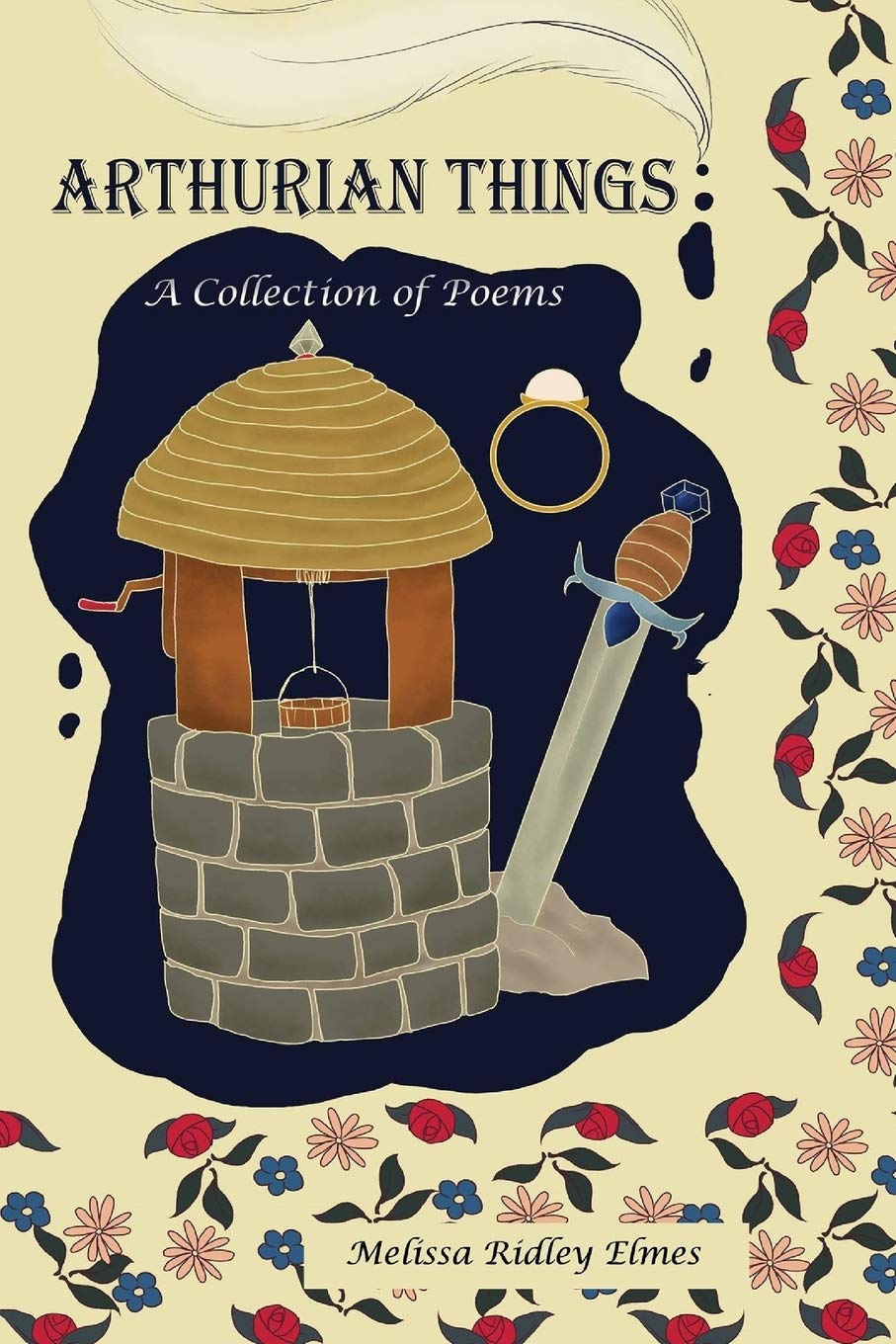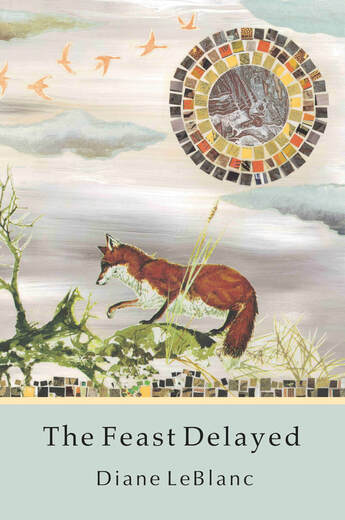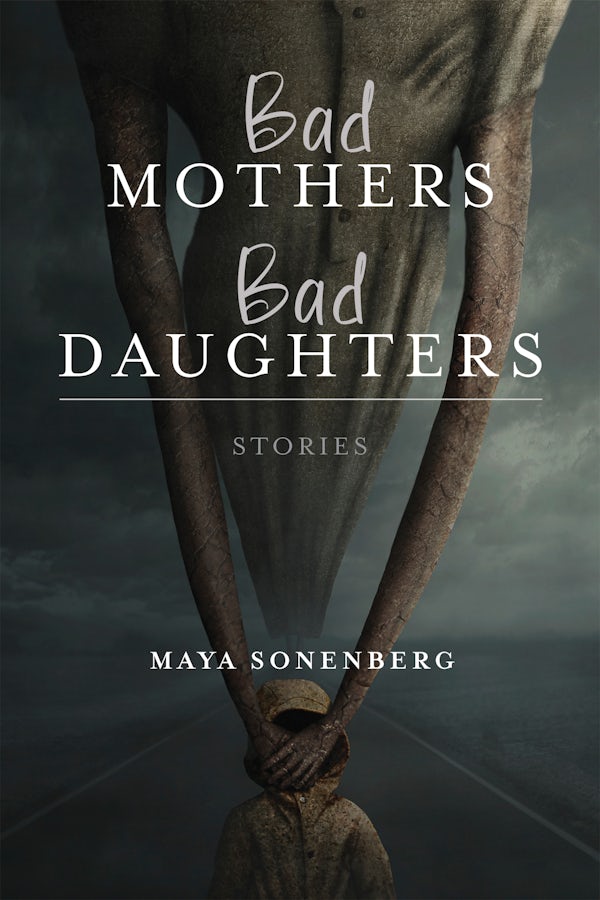 Taking on a legend is never an easy task, and the Arthurian legend is ages old and feels as if it were set in stone. In her collection of poems giving voice to Arthurian Things, Melissa Ridley Elmes has undertaken to add to the canon of Arthuriana poems that imagine voices, tell tales, and create scenes in which the once-and-future King Arthur and his knights are endowed with humor and humanity.
Taking on a legend is never an easy task, and the Arthurian legend is ages old and feels as if it were set in stone. In her collection of poems giving voice to Arthurian Things, Melissa Ridley Elmes has undertaken to add to the canon of Arthuriana poems that imagine voices, tell tales, and create scenes in which the once-and-future King Arthur and his knights are endowed with humor and humanity.
Pay Attention – Taste – Remember: Review of Diane LeBlanc’s Poetry Collection, The Feast Delayed
 In LeBlanc’s poetry, grief enters through the senses, often the sense of taste. The collection is imbued with flavors. While I read, they lingered on my tongue. In some of the poems, the flavors are bitter and reflect the bitterness of loss and injustice. The prose poem “Expired” takes us through the journey of cleaning out the spice cupboard, of searching out the jars past their expiration dates.
In LeBlanc’s poetry, grief enters through the senses, often the sense of taste. The collection is imbued with flavors. While I read, they lingered on my tongue. In some of the poems, the flavors are bitter and reflect the bitterness of loss and injustice. The prose poem “Expired” takes us through the journey of cleaning out the spice cupboard, of searching out the jars past their expiration dates.
A review of Bad Mothers, Bad Daughters by Maya Sonenberg
 As the reader gets into the stories, the fairytale nature of their shortcomings likewise becomes clear, giving these stories an air of fable – not a moral lesson so much as an insight into human frailties and failings, both mothers and their offspring, merely two sides of the same coin; a parade of characters who come up short.
As the reader gets into the stories, the fairytale nature of their shortcomings likewise becomes clear, giving these stories an air of fable – not a moral lesson so much as an insight into human frailties and failings, both mothers and their offspring, merely two sides of the same coin; a parade of characters who come up short.
An interview with East of Troost’s Ellen Barker
 The author of East of Troost talks about her new novel and its inspiration, the decisions she made about the book and areas of potential pushback, other books dealing with racism that have had a strong impact on her, her new book set in St Louis, and more.
The author of East of Troost talks about her new novel and its inspiration, the decisions she made about the book and areas of potential pushback, other books dealing with racism that have had a strong impact on her, her new book set in St Louis, and more.
A review of Cora’s Kitchen by Kimberly Garrett Brown
 Kimberly Garrett Brown has written an outstanding novel which rings true as a depiction of a budding writer and conveys an important message about overlapping, concurrent forms of oppression.
Kimberly Garrett Brown has written an outstanding novel which rings true as a depiction of a budding writer and conveys an important message about overlapping, concurrent forms of oppression.
A review of Breathing Lake Superior by Ron Rindo
 I was drawn to the novel because of geographic sentiment, being a Canadian raised on a small farm in the rigorous climate of Northern Ontario, and having relatives who live on the northern shore of Lake Superior. I was soon caught up in a timely story, full of vivid imagery and unforgettable characters – a tragedy in a beautiful landscape.
I was drawn to the novel because of geographic sentiment, being a Canadian raised on a small farm in the rigorous climate of Northern Ontario, and having relatives who live on the northern shore of Lake Superior. I was soon caught up in a timely story, full of vivid imagery and unforgettable characters – a tragedy in a beautiful landscape.
A review of How Icasia Bloom Touched Happiness by Jessica Bell
 Like the best sci fi writers, Bell doesn’t hesitate to draw out the parallels between her futuristic world and our own, using the imaginary to highlight the all-too-real. What is also obvious is that there are some aspects of life that are core to happiness, no matter the context: love, empathy, and care.
Like the best sci fi writers, Bell doesn’t hesitate to draw out the parallels between her futuristic world and our own, using the imaginary to highlight the all-too-real. What is also obvious is that there are some aspects of life that are core to happiness, no matter the context: love, empathy, and care.
A review of Witches, Women and Words by Beatriz Copello
 In Beatriz Copello’s powerful and imaginative poetry collection Witches, Women & Words, witches are seers, healers and instigators of change who are capable of restoring balance both to society and to the individual. They embody that intuitive and creative side of ourselves that reveals a deeper truth. The poems are visceral, full of irony and wisdom, taking the reader on a transformative journey that ultimately expresses hope.
In Beatriz Copello’s powerful and imaginative poetry collection Witches, Women & Words, witches are seers, healers and instigators of change who are capable of restoring balance both to society and to the individual. They embody that intuitive and creative side of ourselves that reveals a deeper truth. The poems are visceral, full of irony and wisdom, taking the reader on a transformative journey that ultimately expresses hope.
A review of Our Laundry, Our Town by Alvin Eng
 For Alvin Eng, a Chinese American punk rocker who is now an educator and a playwright, this has meant ‘a spiritual state of homelessness,” moving between the Foo J. Chin Chinese Hand Laundry and an American frame of reference. This reflective and personal narrative is his first memoir, and a change from his dramatic writing.
For Alvin Eng, a Chinese American punk rocker who is now an educator and a playwright, this has meant ‘a spiritual state of homelessness,” moving between the Foo J. Chin Chinese Hand Laundry and an American frame of reference. This reflective and personal narrative is his first memoir, and a change from his dramatic writing.
An interview with Jane Enright
 The author of Butter Side Up talks about her new book its unique hybrid of memoir and how-to, the book vs her speaking gigs, the accompanying playbook, Jane’s Jam and how the two should be used together, and more.
The author of Butter Side Up talks about her new book its unique hybrid of memoir and how-to, the book vs her speaking gigs, the accompanying playbook, Jane’s Jam and how the two should be used together, and more.